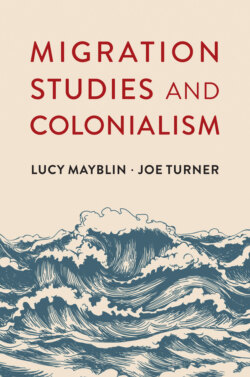Читать книгу Migration Studies and Colonialism - Lucy Mayblin - Страница 12
2 Time and Space: Migration and Modernity Introduction
ОглавлениеThis chapter discusses a central concern for scholars working with postcolonial and decolonial theory: modernity. These debates are vital for centring colonialism in migration studies. The idea that some parts of the world became modern through, inter alia, the Renaissance, the French Revolution, the Industrial Revolution, and beyond, and that others did not, is fundamental to much social scientific enquiry (Bhambra 2007). Some of the key features of modernity are scientific progress, democracy, human rights and capitalism. Where these features are absent, it is often suggested that they must be promoted in order that societies who are ‘behind’ might ‘catch up’. This distinction between the ‘modern’ world and the ‘traditional’ world endures today in distinctions between developed and developing countries. It has also structured the academic division of labour in terms of the legitimate objects of study, and particularly the legitimate societies for different types of enquiry. Sociology, for example, tends to focus on ‘modern’ societies such as France or Australia, countries which are not within the purview of development studies. In turn, this framing then has significant implications for how migration is researched and understood in, and between, different parts of the world.
This chapter thus explores the concept of modernity within the social sciences and explicates the ways in which modernity has been denaturalized and parochialized by postcolonial and decolonial studies. We discuss two key aspects of the conceptual framework of modernity, the temporal and the spatial, and how these aspects are deeply connected to colonial histories. We then discuss the under-recognized darker side of modernity. This darker side draws attention to historical omissions, erasures and silences, which complicate our understanding of the emergence of modernity. The next section focuses on the issue of Eurocentrism, and how Eurocentric perspectives emerge from, and are fed by, the uneven global politics of knowledge production. This discussion is very important for rethinking contemporary migrations because it unsettles the underlying framework from which much research into international migration begins. Following this, we explore how ideas of Eurocentrism link to dichotomies around West and East, North and South, and how these types of distinction emerge from histories of colonialism. At the same time, imaginaries such as ‘the West’ and ‘the Global South’ are shifting symbolic geographies of territory, race and culture whose content changes over time.
The penultimate section discusses a specific idea, that of ‘development’, and how ideas of development follow colonial ways of understanding the world. The final section asks whether Eurocentrism can be overcome since, as Walter Mignolo argues, we are all trapped in the colonial matrix of power. We present some perspectives that have sought to overcome or think from the borders of modern/colonial thinking as indications that this work is indeed being done already. As a whole, these discussions lay the groundwork for much of what follows in the book and as such the discussions follow through and are elaborated through the subsequent chapters.
